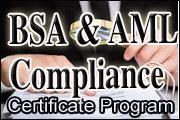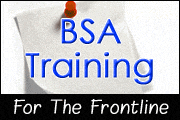What Is The Anti-Money Laundering Act?Money laundering is a process where criminals attempt to conceal illegally obtained funds by transferring into or through banks or legitimate businesses. By doing so, the criminals can then spend or use the money without raising suspicion. The three stages of money laundering consist of:
- Placement: The movement of cash from its source via means such as currency smuggling, bank complicity or the blending of funds
- Layering: Implementing various techniques that make it more difficult for law enforcement to follow the trail of illicit funds
- Integration: The process of moving the laundered money into the economy and through the banking system by means such as property dealing and fraudulent loans
Congress passed the Bank Secrecy Act (BSA), often referred to as the anti-money laundering law (AML), in 1970 to enable U.S. banks to help government and law enforcement agencies detect and prevent money laundering activities. The BSA includes a series of implementing regulations known as anti-money laundering rules. FINRA Rule 3310 lists the standards that a bank must adhere to maintain compliance with the AML rules. Firms that do not comply could face significant financial, and in some cases, criminal penalties.
What Is An AML Officer?In order to oversee internal anti money laundering policies and remain compliant with important regulations, banks, credit unions and similar financial institutions are required to appoint an Anti Money Laundering (AML) Compliance Officer.
What Does An AML Officer Do?An AML officer is primarily responsible for overseeing the development and implementation of the company's AML compliance program and the training of the staff.
What Are An AML Officer's Duties & ResponsibilitiesThe AML Officer should:
 Review practices
Review practices- Conduct investigations
- Identify potential risks
- Maintain regulatory knowledge
- Review and update internal policies
- Prepare and file required documents
- Train staff on potential AML issues and corporate AML policies
Other roles of an AML Officer include coordinating internal audits and making compliance recommendations based on their findings.
Experience The Bank Training Center DifferenceBankTrainingCenter.com is one of the verticals that comprise TrainingCenter, a leading provider of training services for industries such as banking, insurance and finance since 1994. As a banking professional, you'll have access to a series of programs that provide essential information regarding the latest, most relevant topics impacting the industry. In addition to our AML training offerings, you can also choose courses covering cyber security, call reports, fraud, deposit compliance and much more.
As a Bank Training Center student, you'll have the opportunity to choose from multiple program formats, including online webinars, in-person seminars, online courses, offline materials and audio conferences. All courses are informative and easy to follow, enabling you to maximize your learning experience. Whether you're looking to boost your industry knowledge or meet your compliance requirements, you'll find the courses that will fit your educational needs and also suit your learning style.
Order Your AML Compliance Training Course Today!Take a closer look at our entire catalog of anti-money laundering training programs and place your order today. Feel free to contact us online if you have questions or concerns about any of our courses.





